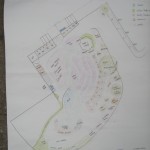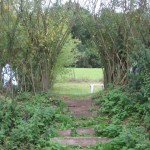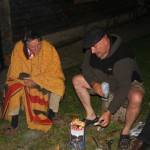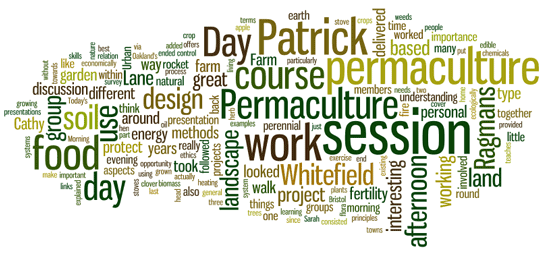Permaculture design course daily log
Day 1 – I have been reading and studying permaculture since 1996, things came to a head a few months ago when I realized that I needed to do the full permaculture design course in order to pull together the disparate knowledge together into a cohesive system. I have just finished the first day of the design course here at Ragmans lane farm with Patrick Whitefield, as a tutor myself I find Patrick’s method of teaching refreshing and interactive. The morning session looked at what permaculture is, and what it is not, this was delivered via an analogy between a battery hen and a hen that is part of a permaculture system. Cathy Whitefield delivered the permaculture ethics section of the course, and provided us with an interesting exercise where we questioned our personal lives in relation to the ethics. For the afternoon session Patrick took us for walk around the Farm to show us different aspects of the landscape affected other parts of the landscape. The tail end of the walk round the farm looked at apple processing from apple tree to bottling, the production of mushroom logs, and biomass heating systems. My impression of the first day here is a very positive one, everyone who is on the course are keen to share their skills amongst the group, we all chip in and do the washing up together, as i type we are all sat outside the kitchen round the fire sharing stories and skills. There is a sense of community and interaction happening here that is sadly lacking in our money obsessed society.
Day 2 – What a great day today has been, Patrick really is a great teacher, he almost effortlessly instilled in us the principles of permaculture by both providing understandable examples and also by group self discovery where we looked at how we had personally had worked with the principles. In the afternoon Cathy Whitefield took us for walk up the hill of Ragmans Lane farm where we learnt a little about how to read the landscape, this was particularly interesting as we looked at different aspects of the landscape through the use of objectivity, imagination and intuition. For the remainder of the afternoon Patrick took us through the setting up and understanding of Forest Gardens by telling us about existing projects and giving us the opportunity to design our own forest garden on paper.
Day 3 – When all around us are frivolously frittering away our precious supplies of oil and gas, it’s comforting to know that Permaculture is not only looking at energy and resource depletion in a realistic way, but at the same time is also offering solutions to this ever-increasing crisis. From Permaculture and DIY culture in general the invention of things like rocket stoves, biomass bench heaters and wood gasification offers us some alternatives when we think about heating ourselves and cooking the food we eat. Central to Permaculture is the principle of capture and store, this can be seen in action in eco builds where rammed earth walls and passive use of the sun are able to generate heat within the home and work environment. One of the central discussions on day three was how we use energy in terms of our needs, and since current consumption of energy is not based on needs this is something that we should all consider as we enter into energy descent.
Day 4 – For the flora and fauna of our planet, Soil is of the utmost importance, without it we would be nothing, our earth would be a barren wasteland, Permaculture recognises the importance of soil and teaches us to work with the different types of soil that make up the structure of the earth. Permaculture teaches us to protect the soil that is beneath us by building up a mulch on top of the existing soil, this keeps the goodness in the soil and actually helps to build up the fertility. As a gardener the study of the soil is very important to my own personal work, and I will be incorporating some of what I have learned on the course today.We also studied the importance of transition towns in the late morning session, for many who were unfamiliar with TT, this put our studies into a direct context. During the afternoon session Patrick took us out into the field and taught us how to work within nature in relation to contours, hills and the general shape of the land. This was followed by a placement exercise where we were given the opportunity to apply some of our theoretical learning from the previous session.
Day 5 – It is both wasteful and polluting to use petro chemicals to control weeds in agriculture. Under permaculture systems bio-cropping offers us a fertile alternative, for instance when using white clever instead of chemicals the weeds are controlled to a certain extent by the spread and cover of the clover, but the added bonus of using the clover means that nitrogen is added to the soil which increases the feed and fertility to which ever crop is being grown, this makes a lot of sense both ecologically and economically but would be very difficult for most farmers who are locked into the same monitary trap as the rest of us are in, for the farmer he is literally chained to his chemical supplier in the cycle of debt as a control mechanism. Similarly mulching is an ecologically sound and economically viable way of protecting both plants and crops in a natural way, as nature sheds the years flora, it returns to the ground to protect and cover the seeds for the next years growth. 
Day 6 – Today’s session was split up into Urban permaculture and perennial vegetable. Urban permaculture is the most importent area of its proliferation, the reason is simple, Cities and Towns are population dense, most people live in cities and towns, and it is here where we really need to see permaculture making its way into peoples back gardens.
Set against a back drop of peak oil the use of perennial planting within an urban context gives us at least some continuity in our food supply. For those in the UK who think that there are only one or two perennial vegetables, think again, there are many, and most are easy to cultivate for those with little experience of gardening and food growing. The afternoon session consisted of an interesting walk into the woods at Ragmans Lane farm with Patrick who showed us how to identify both edible and none edible trees. Matt the owner of Ragmans Lane Farm ended the day with a session where he explained the permaculture that they use.
Day 7 – Today’s sessions are particularly important in working towards a Permanent Culture, the Morning session consisted of Gardening, and a session delivered by Sarah Pugh of Bristol Permaculture, Sarah provided us with examples of projects and areas around Bristol that were up and running and living proof of the viability of Urban Permaculture. The afternoon session involved a site survey of the Permaculture food and herb garden that our group are working on as the main body of our presentation, this session involved carrying out a detailed survey of the land in order that maximize food output, whilst reducing the work input and maintaining soil fertility throughout. The day ended with a discussion about food links and low-carbon buildings, a great day all in all.
Day 8 – Windbreaks that are situated in the right place can do a number of things, increase crop yield, protect crops from frost, and can protect plants from wind damage. This session explained the best type of trees and shrubs to use for particular situations. After this short but interesting session we broke up into our groups to work on our design project. After lunch it was back to our design project where we designed the garden based on the natural curves of the land, this was followed by an open space discussion were course members did informal presentations on their own personal projects that they were working on at home. 
Day 9 – Today was one of those ‘cram your head full of info’ type days, a quite in-depth session about biodiversity and water usage and storage in the morning and a visit to Oakland Park in the afternoon. At Oakland’s park the methods of growing food are based on Rudolph Steiner’s bio dynamic homeopathic methods, I don’t have time to go into the details of these methods, except to say that they are very unorthodox, alchemical and based on our interactions with plant Divas, Patrick Whitefield asked me what my thoughts were about Oakland’s on our return from the Estate, in a nutshell, these methods provide cleanly grown healthy nutritious food without the aid of any agrochemicals whatsoever. Patrick and I both agreed that at the end of the day, if it worked, it worked regardless of its methodologies. In the evening, I had the chance to put on a Rocket stove group for course members, which involved me speaking a little about their origins, followed by a demonstration and discussion of how to make and use rocket stoves. 
Day 10 – Its been an intensely interesting and exhausting two weeks of learning, sharing, laughing and thinking that is now on its last day. Today is the culmination of our work in terms of the design project that we had been working on in our respective groups, we did a 45 minute presentation discussing many different aspects of the food and herb garden that we were designing, the presentation along with everybody elses went really well. After the presentations Patrick commented on the quality of the work that this years group had produced, this left us feeling like our hard work had paid off. We celebrated in the evening by eating and playing music around the fire, I thrashed some folky type chords and reggae bass lines out that were accompanied by a viola and a an acoustic guitar.
End of course -Patrick and Cathy Whitefield presented us with our certificates on Saturday Morning after a brief discussion about forming links with other permaculture groups via the Permaculture association. On a personal level, it was much more exciting and rewarding for me to receive this certificate than when I picked up my ‘piece of Paper’ after three years at a good University. It was a sad affair when it came to leaving Ragmans Lane Farm, strong new friendships were formed which I have no doubt will last and will be fruitful. On my part I am just about to set up a Permablitz group on Facebook for course members and others, the purpose of this is that can turn up on mass as somebody’s project and work intensively on the land thus speeding up the process of raising the fertility of the land at whatever project we are working on, and to help people work towards fuel and food self-reliance in the process. I had a brilliant and enlightening time at Ragmans Lane Farm which I will never ever forget, Patrick Whitefield is an incredibly knowledgeable man when it comes to the understanding of how the natural landscape best work, who has an intimate understanding of the landscape based on a decade of actually living on the land itself and being incredibly observant. I would like to thank Patrick and Cathy Whitefield for being both great teachers and warm and genuinely friendly hosts for our stay at Ragmans, and hats off to Cari for great food and conversation.
Steve

